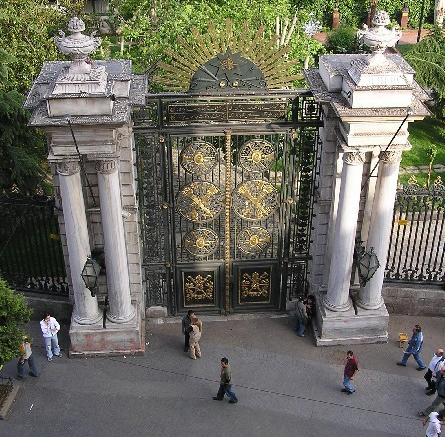The Ottoman sultans ruled from the Topkapı Palace for centuries
Istanbul, historically known as Byzantium and Constantinople (see the names of Istanbul for further information) is the largest city of Turkey. According to the address-based birth recording system of the Turkish Statistical Institute, the metropolitan municipality (province) of the city had a population of 13.26 million as of 2010, which is 17.98% of Turkey's population and the largest in Europe before Moscow.
The waterfront yalıs on the Bosphorus are among the most noticeable traits of Istanbul's cityscape
The last census data from 2000 puts its proper population at 8.8 million. Istanbul is a megacity, as well as the cultural, economic, and financial centre of Turkey. It is located on the Bosphorus Strait and encompasses the natural harbour known as the Golden Horn, in the northwest of the country. It extends both on the European (Thrace) and on the Asian (Anatolia) sides of the Bosphorus, and is thereby the only metropolis in the world that is situated on two continents. Istanbul is a designated alpha world city.
During its long history, Istanbul has served as the capital of the Roman Empire (330–395), the Eastern Roman (Byzantine) Empire (395–1204 and 1261–1453), the Latin Empire (1204–1261), and the Ottoman Empire (1453–1922). When the Republic of Turkey was proclaimed on 29 October 1923, Ankara, which had previously served as the headquarters of the Turkish national movement during the Turkish War of Independence, was chosen as the new Turkish State's capital.
A mix of old and new, as roads now travel through the arches of the 4th-century Valens Aqueduct.
Istanbul was chosen as a joint European Capital of Culture for 2010 and the European Capital of Sports for 2012. Istanbul is currently bidding to host the 2020 Summer Olympics. The historic areas of the city were added to the UNESCO World Heritage List in 1985.
View of the Galata Bridge spanning the Golden Horn, with the Galata Tower in the background, ca. 1892-1893
The city covers 39 districts of the Istanbul province.
The Hagia Sophia, from Byzantine times, as it stands today, with the minarets added by the Ottomans
Dolmabahçe Palace, an example of the Ottoman Baroque architecture
Bosphorus Bridge and the skyline of Istanbul, with Levent financial district seen at the center of the frame, and Maslak financial district seen at right
Inside the Church of St. George, the seat of the Greek Orthodox Patriarchate
The Armenian Patriarchate
Bankalar Caddesi in Galata Istanbul
Maslak financial district Istanbul
Levent financial district in Istanbul
İstanbul Üniversitesi
Gate of Galatasaray Lisesi from above
Bosphorus University
Kuleli Istambuł
Istanbul Ataturk Airport International Terminal
Haydarpasha train station
Byzantine remains of a column found at Byzantium's acropolis, located today within the Topkapı Palace complex
 00:11
00:11
 homesweethome
homesweethome























 Posted in:
Posted in: 









0 意見:
Post a Comment